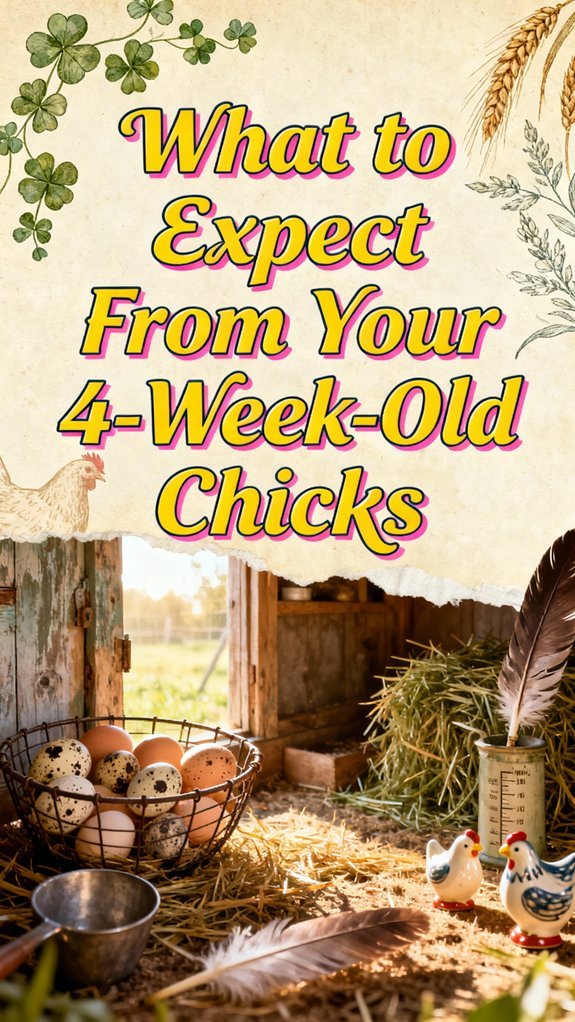Yes, you can safely feed your chickens sunflower seeds as a nutritious treat. These seeds contain 20-25% protein and essential nutrients like vitamin E, B-complex vitamins, and minerals that support muscle development, egg production, and feather health. For best benefits, offer raw, unsalted seeds in moderation – about one tablespoon per three to six chickens per feeding session. While sunflower seeds provide excellent nutritional value, understanding proper portion control and feeding guidelines guarantees your flock’s health and wellbeing.
Nutritional Benefits of Sunflower Seeds for Chickens
While chickens benefit from diverse feed sources, sunflower seeds stand out as an exceptional nutritional supplement due to their thorough nutrient profile. You’ll find they contain 20-25% protein, essential for muscle development and nutrient absorption, along with methionine that supports healthy growth and robust egg production. Black sunflower seeds provide the highest oil content at 40-50%, making them especially nutritious for chickens. These seeds deliver concentrated healthy fats, particularly monounsaturated varieties, which enhance energy levels and egg weight. They’re packed with vitamin E, B-complex vitamins, and indispensable minerals like selenium and magnesium that strengthen immune function. The antioxidant properties help maintain cellular health under stress, while the combination of protein and vitamins promotes superior feather quality. Research indicates that the lipid content specifically contributes to improved eggshell strength and more vibrant yolk coloration, making sunflower seeds a valuable dietary addition for laying hens. The seeds’ thin hulls make them particularly digestible for chickens compared to other seed varieties.
Safe Feeding Guidelines and Recommended Amounts
Three key principles govern safe sunflower seed feeding for chickens: proper seed selection, controlled portions, and appropriate delivery methods. You’ll want to choose farm-supply or wild-bird store sunflower hearts over supermarket varieties, which contain harmful additives. For ideal portion control, limit feeding frequency to occasional treats, offering approximately one tablespoon per three to six chickens per session. You can present the seeds separately from regular feed or offer whole seed heads to promote natural foraging behavior. When incorporating sunflower seeds into your flock’s diet, confirm they’re thoroughly dried to prevent mold growth, and store them in cool, dry conditions. Monitor your chickens’ consumption carefully, as these high-fat treats require moderation to prevent obesity and maintain balanced nutrition. The black oil variety provides an excellent energy source with its high fat and protein content, making it an ideal choice for supplemental feeding. Be mindful that seed shell tips can potentially harm your chicken’s palate, so consider removing shells for safer consumption. The seeds’ rich vitamin E content helps maintain healthy feathers and supports overall immune function.
Understanding Different Types of Sunflower Seeds
To effectively feed sunflower seeds to chickens, you’ll need to understand the two primary classifications: oilseed and confectionery varieties. Oilseed sunflower seeds contain approximately 50% fat and feature smaller, black shells, while confectionery varieties are larger with distinctive black and white stripes and higher protein content.
Within these sunflower seed varieties, you’ll find different oilseed classifications based on fatty acid composition: traditional linoleic, mid-oleic (NuSun), and high-oleic types. NuSun offers enhanced disease resistance, while high-oleic seeds contain increased monounsaturated fats. When selecting seeds for your chickens, consider the physical characteristics including moisture content (ideally 7%), absence of pest damage, and proper storage conditions. Size variations depend on genetics and growing conditions, which can affect how easily your chickens consume them. For optimal quality assessment, samples should undergo thorough cleaning and sorting to remove any debris, mechanical impurities, or damaged seeds.
Potential Health Risks and Precautions
Although sunflower seeds offer nutritional benefits for chickens, several health risks require careful consideration. You’ll need to avoid salted or seasoned varieties, as they can cause salt toxicity, leading to severe dehydration and kidney damage. Without adequate grit, these seeds may cause digestive blockages or crop impaction in your flock. The seeds’ abundance of essential vitamins B helps maintain proper metabolism and digestion in adult chickens. Black oil sunflowers are particularly beneficial due to their thinner shells that chickens can easily consume.
Watch for obesity risks, as sunflower seeds’ high fat content can lead to excessive weight gain and metabolic disorders. You should limit portions and guarantee your chickens maintain regular physical activity. Consider using shelled seeds to prevent allelopathic effects on your run’s soil, though they’re more expensive. Don’t feed sunflower seeds to chicks, as their digestive systems aren’t developed enough to handle them safely. Instead, reserve these treats for adult birds and monitor their consumption carefully.
Effects on Chicken Behavior and Well-being
Sunflower seeds greatly influence chicken behavior and well-being through multiple physiological and social mechanisms. You’ll notice increased pecking behavior and excited clucking when offering these treats, as chickens strongly prefer their palatability. The high fat and protein content stimulates activity levels, particularly beneficial during cold weather for maintaining energy balance. Their content of vitamin E antioxidants helps support strong immune function and cellular health.
These seeds play an essential role in social bonding, as treat-feeding sessions encourage flock gathering and interaction. However, you’ll need to monitor consumption carefully, as overfeeding can reduce interest in regular feed and natural foraging. During molting, sunflower seeds support feather regrowth and minimize molt duration, though proper grit access remains essential for healthy crop function. Environmental enrichment through sunflower plants can provide additional mental stimulation and comfort for your flock.
Best Practices for Feeding Sunflower Seeds
Understanding proper feeding techniques maximizes the benefits of sunflower seeds while minimizing potential health risks in your flock. You’ll need to limit seeds to 10% of your chickens’ total diet, offering approximately one tablespoon per 3-6 birds daily. For ideal results, scatter whole black oil sunflower seeds on the ground to promote natural foraging behavior. Hanging seed heads provides enrichment and entertainment while encouraging natural pecking behavior.
Consider seasonal considerations when adjusting portions – cold weather and molting periods warrant slightly increased quantities for extra energy. You’ll want to guarantee clean, fresh water and grit availability to aid digestion. Store seeds in cool, dry conditions, and source them from reputable suppliers to avoid pesticide exposure. Monitor your flock for weight changes and maintain balanced feed consumption when incorporating sunflower seeds into their diet.







